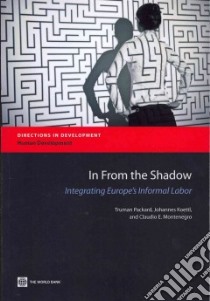In From the Shadow - 9780821395493
Un libro in lingua di Truman Packard Johannes Koettl Montenegro Claudio E. edito da World Bank, 2012
- € 20.90
- Il prezzo è variabile in funzione del cambio della valuta d’origine
What to do about the extent of unregulated informal employment and the size of the shadow economy is a dilemma that has been gaining urgency, particularly in Europe's periphery. The forces that accompany globalization put a premium on mobility and skill-renewal. Rapid population ageing will require that people work longer and be far more productive. To achieve this, social and economic institutions have to be more pro-employment, encouraging greater participation in the formal economy. And looking ahead, public financial resources will be increasingly scarce, giving urgency to measures that can significantly and sustainably increase tax revenue. This book is about workers in Europe who earn a living working full or part-time in untaxed markets for goods, services and labor. Their activities are not registered as part of the economy, and because they go unrecorded, they are also unregulated. This makes them illegal although not in essence criminal. Some call this the underground economy, black market or the shadow economy. Widespread informal employment in the shadow economy posses problems for individuals and their families, but it is also a problem for firms and society. This volume presents the rationale and steps policy makers in the EU's newest member countries should take to bring as much economic activity in from the shadow economy as they can. The authors venture a general conclusion: Although it may be necessary to improve the structural incentives created by the structure of taxation, labor market regulation, and social protection policies, doing so is not sufficient to achieve real improvement. As important, is a government's credibility in the eyes of working people in carrying out the state’s unique and critical role of providing and maintaining public goods. The process of improving governance and increasing institutional credibility is long and difficult, but key to changing the circumstances that lead people into the shadowy unregulated and untaxed markets. Deriving specific policy guidance and recommendations from rigorous analysis using administrative and unit-level survey data the book draws a set of general policy suggestions for EU members, old and new, as well as those who aspire to join the Union. Although aimed specifically at emerging Europe, this policy guidance will resonate with decision makers in middle and upper-middle income countries in other parts of the world.
Informazioni bibliografiche
- Titolo del Libro in lingua: In From the Shadow
- Sottotitolo: Integrating Europe’s Informal Labor
- Lingua: English
- Autori : Truman Packard Johannes Koettl Montenegro Claudio E.
- Editore: World Bank
- Collana: World Bank (Paperback)
- Data di Pubblicazione: 27 Luglio '12
- Genere: POLITICAL SCIENCE
- Argomenti : Informal sector (Economics) Taxation Europe Taxation Europe
- Pagine: 174
- ISBN-10: 0821395491
- EAN-13: 9780821395493


